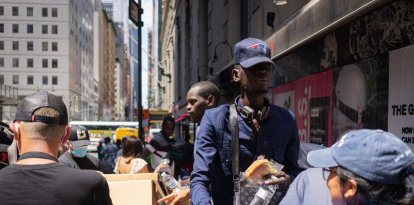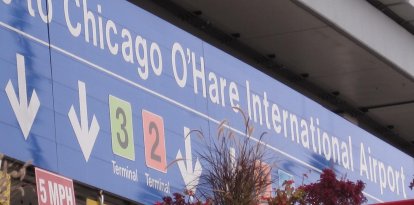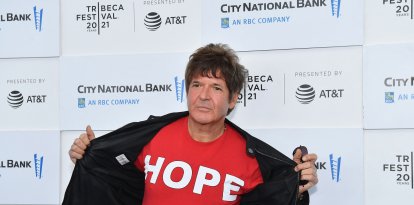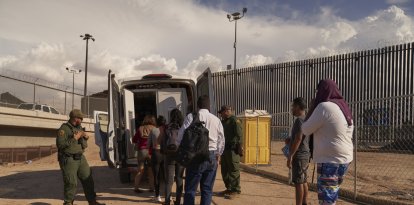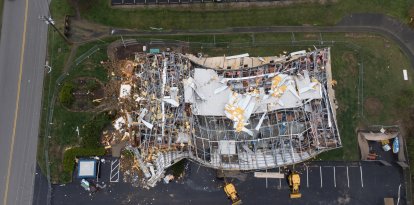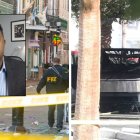Soldier Matthew Livelsberger identified as the attacker who detonated a Cybertruck at a Trump Hotel in Las Vegas
According to authorities, the suspect's body had a "self-inflicted" bullet to the head.
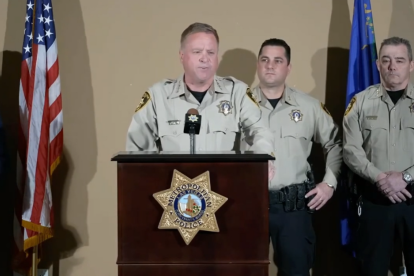
Metropolitan Police Department Sheriff Kevin McMahill
Authorities identified the suspect who blew up a Tesla Cybertruck at President-elect Donald Trump's Las Vegas hotel Wednesday.
Matthew Livelsberger, a decorated Army special operations soldier, was on authorized leave at the time of the attack.
Las Vegas Police Sheriff says the driver of the Cybertruck that was rigged with fireworks and explosives outside of Trump Hotel in Vegas, Matthew Alan Livelsberger, also “sustained a gunshot wound to the head prior to the detonation of the vehicle”
— America (@america) January 2, 2025
pic.twitter.com/4L0pa4ZV80
"The U.S. Army Special Operations Command can confirm that Livelsberger was assigned to command and was on approved leave at the time of his death," a spokesman said.
According to various reports, Livelsberger had an extensive military career, with deployments to the Republic of Congo in 2014, Ukraine in 2016, Tajikistan in 2016 and Afghanistan in 2017, 2018 and 2019.
Las Vegas authorities explained that the body of Livelsberger, a 37-year-old military man originally from Colorado, was unrecognizable due to the blast. However, they confirmed that the body had "a self-inflicted bullet" to the head, suggesting the soldier committed suicide moments before the explosion.
Authorities confirmed Livelsberger as a suspect after they found a military ID, passport and credit cards in the soldier's name at the scene. However, Sheriff Kevin McMahill of the Las Vegas/Clark County Metropolitan Police Department told a news conference that he could not 100% confirm Livelsberger as the perpetrator until DNA results or medical records are available to identify the body.
However, authorities also confirmed other evidence pointing to Livelsberger, including tattoos on his stomach and arms that match the suspect's description.
McMahill also confirmed that the suspect was carrying several weapons and explosives, further stating that authorities believe there are, at this time, no other individuals or organizations associated with Livelsberger.
"We don’t believe there’s any further threat or anyone associated with him in Las Vegas," McMahill told reporters.
Authorities are still investigating the event as a terrorist act, which also coincided with another attack in New Orleans, where an ISIS-linked man rammed a pickup truck into a crowd, killing at least 15 people.
A common detail of the cases, which occurred on January 1, 2025, is that the suspects rented their vehicles through the same company, Turo, a fact that prompted authorities to intensify their investigations into whether there was a link between the two attacks.
In the case of Las Vegas, authorities also do not rule out that there are political motivations behind the attack, considering that the explosion occurred on one of President Trump's properties and with a Tesla car, the company owned by Elon Musk, an ally of the Republican leader.
During the press conference, McMahill also stated that Elon Musk had sent a Tesla team to retrieve footage from inside the exploded Cybertruck and thanked the company's CEO for his support in the investigation.
"He gave us quite a bit of additional information in regards to how the vehicle was locked after it exploded due to the nature of the force from the explosion as well as being able to capture all of the video from Tesla charging stations across the country," the sheriff said.
🚨BREAKING: Las Vegas authorities say Elon Musk has dispatched a Tesla team to retrieve footage from inside of the exploded Cybertruck.
— Benny Johnson (@bennyjohnson) January 2, 2025
pic.twitter.com/o8GXuExjCW
The Bureau of Alcohol, Tobacco, Firearms and Explosives (ATF) also reported that it traced the guns to Livelsberger, who legally acquired them last Dec. 30.
RECOMMENDATION
